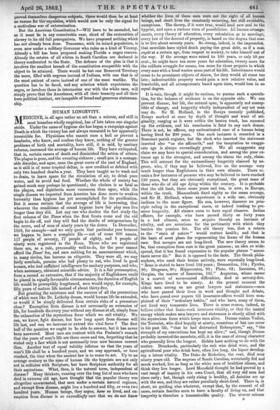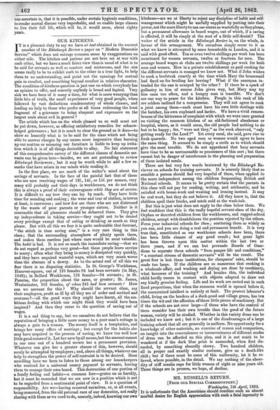HUMAN LONGEVITY.
MEDICINE, in all ages rather an art than a science, and still in most branches wholly empirical, has of late taken one singular stride. Under the name of hygiene she has began a campaign against
Death in which the victory has not always remained to her apparently irresistible foe. Physicians who cannot cure a boil or prevent a headache, who know, and confess they know, nothing of the greater problems of birth and mortality, have still, it is said, by sanitary reforms, increased the average of human life. They have extirpated, that is, certain causes of death and diminished the action of others.
The plague is gone, and the sweating sickness ; small-pox is a manage- able disorder, and ague, once the great curse of the east of England,
as it still is of some tropical deltas, is now credited or debited with only two hundred deaths a year. They have taught as to wash and to drain, to leave space for the circulation of air, to drink pure water, and to avoid bad food. Whether the whole of society has gained much may perhaps be questioned; the cholera is as fatal as the plague, and diphtheria more venomous than ague, while the single disease we imported from America has done more to weaken humanity than hygiene has yet accomplished for its purification. But it seems certain that the average of life is increasing, that wherever the conditions of sound hygiene have fair play men live longer than they did. Let any one who doubts the fact study the first column of the Times when the first frosts come and the old begin to die off, and they will find the deaths of octogenarians by the score, and of men of ninety years by the dozen. In December, 1858, for example—and we only quote that particular year because we happen to have a complete file —out of some 800 names, 117 people of seventy, 77 people of eighty, and 8 people of ninety were registered in the Times. Those who are registered there are, as a rule, presumably well-to-do, for the poor cannot afford the Times' fee, and care nothing for an announcement which, in many circles, has become an etiquette. They were all, we may fairly conclude, persons who had plenty to eat, who lived in good houses, who had sufficient intelligence for sanitary purposes, and who, when necessary, obtained scientific advice. It is a fair presumption, from a record so extensive, that if the majority of Englishmen could be placed in equally favourable circumstances, the duration of English life would be perceptibly lengthened, men would enjoy, for example, fifty years of mature life instead of about thirty-five.
But granting the existence and the success of all the precautions of which men like Dr. Letheby dream, would human life be extended, or would it be simply delivered from certain risks of a premature close? Exemption from disease is not necessarily an extension of life, for hundreds die every year without any disease at all, simply from the exhaustion of the mysterious force which we call vitality. We can, we know, fight disease, but how long apart from disease will life last, and can we increase or extend the vital force ? The first half of the question we ought to be able to answer, but it has never been answered. Most men are content with the Psalmist's remark that the years of man's life are three score and ten, forgetting that he stated only a fact which is not necessarily true now because correct then. Another text of equal validity informs us that the years of man's life shall be a hundred years, and we may approach, or have reached, the time when the ancient law is to cease to act. Up to an average century as the span of human life the hygeists are not only not in collision with Scripture, but have Scripture authority for all their aspirations. What, then, is the natural term, independent of disease? Many thinkers running over the long list of men who have
died in extreme old age, thought that the popular theory was altogether unwarranted, that men under a certain natural regimen, and exempt from disease, might live a hundred and fifty, or even two hundred years. Human beings, they argue, have so lived, and ex- emption from disease is so exceedingly rare that we do not know whether the lives of these men were not the right of all human beings, and short lives the constantly recurring, but still avoidable, exceptions. The theory, if it were true, would lend new zeal to the hygeist, and open a curious vista of possibilities. All human arrange- ments, every theory of education, every calculation as to marriage, every law of the descent of property, is based on the dogma that man is to live about seventy years. So strong, indeed, is the impression, that moralists have styled death paying the great debt, as if a man ought at a certain age, from respect to society, to take himself out of the way. If the average were raised to 100 years, or only 50 per cent., he might have ten more years for education, twenty more for the celibate struggle for means, ten more for those projects in which every man with a head wastes some part of his life. Inheritances would cease to be prominent objects of desire, for they would all come too late ; indestructible property would gain a new relative value, and leaseholds, and all arrangements based upon time, would lose in an equal degree.
It is vain, though it might be curious, to pursue such a specula- tion, for the balance of evidence is on the opposite side. We can prevent disease, but. life, the natural span, is apparently not sump. tible of change, and longevity wholly independent of any act man may do. Sir H. Holland, in the Essays recently published, Essays marked at once by depth of thought and want of ori- ginality, ranging as it were within the beaten track, has summed up the evidence, and his conclusion is fatal to any such dream. There is not, he affirms, any authenticated case of a human being having lived for 200 years. One such instance is recorded in a Somerset parish register, but the clerk who inserted the statement inserted also "as she affirmeth," and the temptation to exagge- rate age is always exceedingly great. We all exaggerate any claim we may have to special consideration, and among the poor ex- treme age is the strongest, and among the slaves the only, claim. This will account for the extraordinary longevity claimed by ne. groes, who, if they may be believed, live on the average very much longer than Englishmen in their own climate. There re- main a few instances of persons who may be believed to have reached 150 years, but they are obviously exceptional, the great mass of those who die of old age dying within the century. It is probable that the old limit, three score years and ten, is now, in Europe, within the truth. Blumenbach fixed eighty as the mean average, and Sir H. Holland, whose experience is a wide one, obviously inclines to the same figure. He can, however, discover no prin- ciple ruling in the exceptional cases, or indeed tending to pre- serve longevity. All classes seem to have equal chances. Indian officers, for example, who have passed thirty or forty years in a bad climate, seem to acquire thereby an increase of vitality, and are notorious for the pertinacity with which they burden the pension list. The old theory was, that a return to the "state of nature" would restore health; and that is the basis of most plans for regenerating the frame of the human race. But savages are not long-lived. The new theory seems to be, that exemption from care is the great panacea; an idea so wide- spread, that it has found expression in the popular phrase "annui- tants never die." But it is opposed to the facts. The Greek philo- sophers, who used their brains actively, were especially long-lived. "Zeno is stated to have lived 102 years ; Democritus, 101 ; Pyrrho, 90; Diogenes, 90; Hippocrates, 99; Plato, 82; Isocrates, 98; Gorgias, the master of Isoerates, 107." Augustus, whose career is a marvel of surmounted difficulties, died at seventy-five. Kings have lived to be ninety. At the present moment the oldest men among us are great lawyers and statesmen—men who have passed their lives in work and thought and debate, who have pored over papers till insurance-offices would have com- plained of their "sedentary habits," and who have, many of them, not lived very temperate lives. There is some reason, indeed, to believe either that brain-work increases vitality, or that the mental energy which makes men lawyers and statesmen is closely allied with the mysterious force which keeps men alive. Dumas makes Vadier, the Terrorist, who died happily at ninety, conscious of but one error in his past life, "that he had distrusted Robespierre," say, "the strength of my convictions has kept me alive ;" and, though Dumas probably invented the anecdote, still, it is the man of strong character who generally lives the longest. Habits have nothing to do with the matter. Drunkards, particularly the rich who drink wine, and the agricultural poor who drink beer, often live long, the liquor develop- ing a latent vitality. The Duke de Richelieu, the roue, died over ninety years old. The negroes of South Carolina, wretchedly fed and much worked, live as long as the white men of healthier climes, and think they live longer. Lord Mansfield thought he had proved by a vast range of inquiry in his own Court, that all very old men had risen early; but, though early rising is healthy, all Asiatics are up with the sun, and they are rather peculiarly short-lived. There is, in short, no guiding clue whatever, except that, by the consent of all races, certain families seem to have a faculty of living on, and that longevity is therefore a transmissible quality. The utmost science
can ascertain is, that it is possible, under certain hygienic conditions, to render mortal disease very improbable, and so enable large classes to live their full life, which will be, it would seem, about eighty years.































 Previous page
Previous page